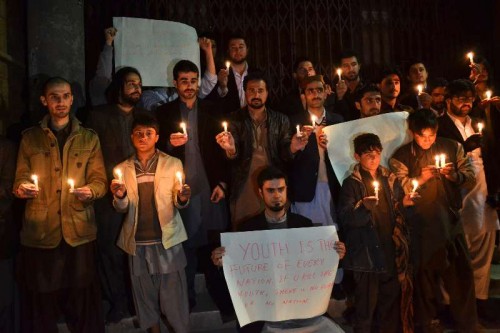
Pakistan Army Chief General Raheel Sharif has approved the execution of six terrorists who were sentenced to death by military courts, a media report said Friday.
“Chief of Army Staff today signed death warrants of six hardcore terrorists convicted by the Field General Court Martial in accordance with law,” Inter-Services Public Relations (ISPR) Director General Major General Asim Bajwa tweeted late Thursday.
The announcement came a day after Prime Minister Nawaz Sharif said that moratorium on execution has been lifted, Dawn online reported.
The army withheld the names of the convicts and said their names will be notified once the executions are completed.
“The six cases cleared for execution had legal procedures completed,” the media report quoted a military spokesman as saying.
The convicts were sentenced in cases relating to the Pakistan Army General Headquarters (GHQ) attack and for an attack on a military camp near River Chenab, beside others.
Officials said those 23 terrorists would be executed within days, and they’re likely to be followed by dozens more hangings at prisons around the country.
The federal government and its four provincial counterparts have drawn up lists of which prisoners would be sent to the gallows. Initial estimates have put the number of convicted terrorists awaiting execution at more than 3000.
Pakistan’s chief justice Nasir-ul-Mulk told lawyers gathered at the Peshawar high court on Thursday that he had convened a meeting of all the country’s high court judges to plan the rapid conclusion of appeals filed by terrorist convicts on death row.
Local news reports varied in their estimates of the number of prisoners who would be put to death in a first wave of executions, but their anonymously sourced reports suggested that they would number 60 to 80.
They would include the perpetrators of many high-profile terrorist attacks, including the leader of an October 2009 attack on the army’s headquarters in Rawalpindi, in which 10 soldiers died. Unconfirmed reports said those being lined up may also include Omar Saeed Sheikh, convicted of the 2002 murder of Wall Street Journal reporter Daniel Pearl in the southern city of Karachi reports Sydney Morning Herald.
The government acted as public grief at Tuesday’s school massacre turned into angry demands for decisive action to end a seven-year Taliban insurgency that has claimed more than 60,000 lives. The death toll from the Peshawar attack rose to 148 on Thursday, as four more people succumbed to their wounds at the city’s Lady Reading Hospital.
Casting aside years of fear, hundreds of civil society activists gathered on Thursday evening for a candlelight vigil outside Islamabad’s Red Mosque, where some 300 armed militants and seminary students were killed in July 2007 in a special forces assault on the mosque.
The imam of the mosque, Mullah Abdul Aziz, has been a focus of public anger after he refused to criticise the perpetrators of Tuesday’s school attack.
His brother had led the militants in the 2007 stand-off and died in the military assault that ended it. Aziz was captured while trying to escape beforehand, disguised as a burqa-clad woman.
On Thursday, Aziz sought to placate the protesters by appearing at their vigil. However he had to make a hurried exit as the crowd chanted that he should “be drowned in a pond”, an Urdu-language insult.
Also on Thursday, an Islamabad judge caused huge embarrassment to the government when he accepted the bail application of the suspected terrorist mastermind of the November 2008 attack on the Indian city of Mumbai. Zaki-ur-Rehman Lakhvi has been charged with planning and remotely directing the three-day rampage, which killed 166 people. The response from Islamabad was swift, as officials rearrested the former Lashkar-e-Taiba operations chief and government prosecutors lodged an appeal of the bail with the Islamabad high court.